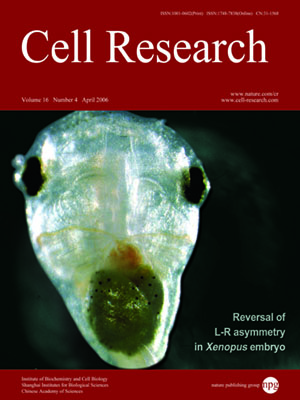
Volume 16, No 4, Apr 2006
ISSN: 1001-0602
EISSN: 1748-7838 2018
impact factor 17.848*
(Clarivate Analytics, 2019)
Volume 16 Issue 4, April 2006: 356-366
ORIGINAL ARTICLES
Overexpression of Aurora-A kinase promotes tumor cell proliferation and inhibits apoptosis in esophageal squamous cell carcinoma cell line
Xiao Xia Wang, Rong Liu, Shun Qian Jin, Fei Yue Fan, Qi Min Zhan
State Key Laboratory of Molecular Oncology, Cancer Institute, Chinese Academy of Medical Sciences and Peking Union Medical College, Beijing 100021, China;
Institute of Radiation Medicine, Chinese Academy of Medical Sciences and Peking Union Medical College, Tianjin 300192, China
Correspondence: Qi Min Zhan, Fei Yue Fan(zhanqimin@chinalab.gov.cn faithyfan@yahoo.com)
Aurora-A kinase, a serine/threonine protein kinase, is a potential oncogene. Amplification and overexpression of Aurora-A have been found in several types of human tumors, including esophageal squamous cell carcinoma (ESCC). It hasbeen demonstrated that cells overexpressing Aurora-A are more resistant to cisplatin-induced apoptosis. However, the molecular mechanisms mediating these effects remain largely unknown. In this report, we showed that overexpression of Aurora-A through stable transfection of pEGFP-Aurora-A in human ESCC KYSE150 cells significantly promoted cell proliferation and inhibited cisplatin- or UV irradiation-induced apoptosis. Cleavages of caspase-3 and poly (ADPribose) polymerase (PARP) in Aurora-A overexpressing cells were substantially reduced after cisplatin or UV treatment.Furthermore, we found that silencing of endogenous Aurora-A kinase with siRNA substantially enhanced sensitivity to cisplatin- or UV-induced apoptosis in human ESCC EC9706 cells. In parallel, overexpression of Aurora-A potently upregulated the expression of Bcl-2. Moreover, the knockdown of Bcl-2 by siRNA abrogated the Aurora-A’s effect on inhibiting apoptosis. Taken together, these data provide evidence that Aurora-A overexpression promoting cell proliferation and inhibiting apoptosis, suggesting a novel mechanism that is closely related to malignant phenotype and anti-cancer drugs resistance of ESCC cells.
Cell Research (2006) 16:356-366. doi:10.1038/sj.cr.7310046; published online 13 April 2006
FULL TEXT | PDF
Browse 2007


